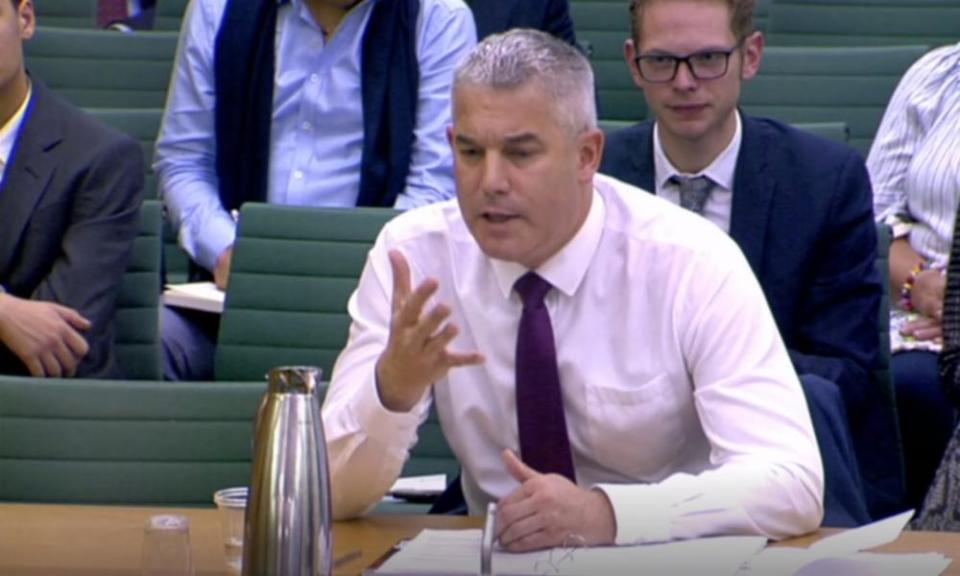Key DUP member voices concerns over Brexit deal

A key member of Northern Ireland’s Democratic Unionist party has spelled out a list of concerns that could scupper Boris Johnson’s plans for an agreement that might allow the UK to leave the EU.
Sammy Wilson, the DUP’s Brexit spokesman, told the Brexit secretary, Stephen Barclay, that there must be consent from both unionists and nationalists in the Northern Ireland assembly in any new arrangements.
The East Antrim MP, who was questioning the minister as part of the Brexit committee, voiced suspicions that the government was planning to keep Northern Ireland in the the EU customs union for practical purposes, and raised the issue of compensation for businesses in the province that could lose out as a result of EU regulations.
Support from DUP MPs could be crucial for the government to sign off a Brexit deal by Saturday. Wilson is one of the most pro-Brexit figures in the parliamentary party.
It comes as fellow DUP figures entered Downing Street for a third round of talks in three days. The EU and UK are seeking ways to avoid a hard border on the island of Ireland as part of a withdrawal agreement.
Counties and customs
Inside the EU, both Ireland and Northern Ireland are part of the single market and customs union so share the same regulations and standards, allowing a soft or invisible border between the two.
Britain’s exit from the EU – taking Northern Ireland with it – risks a return to a hard or policed border. The only way to avoid this post-Brexit is for regulations on both sides to remain more or less the same in key areas including food, animal welfare, medicines and product safety.
The 'backstop' in Theresa May's Withdrawal Agreement was intended to address this - stating that if no future trade agreement could be reached between the EU and the UK, then rules and regulations would stay as they are. This has been rejected by Brexit supporters as a 'trap' to keep the UK in the EU's customs union, which would prevent the UK striking its own independent trade deals.
There are an estimated 72m road vehicle crossings a year between Northern Ireland and the Republic of Ireland, and about 14% of those crossings are consignments of goods, some of which may cross the border several times before they reach a consumer. Brexit supporters say this can be managed by doing checks on goods away from the border, but critics say it will be difficult to police this without any physical infrastructure like border posts or cameras, which could raise tensions in the divided communities of Ireland.
Interactive: A typical hour in the life of the Irish border
Wilson told Barclay that any customs deal affecting Northern Ireland would need the consent of the assembly and must be subject to a cross-community vote.
Without such consent, he said, the government would be in breach of the Good Friday agreement, which is also known as the Belfast agreement.
“All I really want to hear from you today is that the terms of the Belfast agreement, which everyone seems to want to defend, will be the terms on which consent for opting into arrangements which diminish the powers of the NI assembly, which will treat NI differently to rest of UK.
“That consent must be sought on the basis of the Belfast agreement,” he said.
Barclay said the government had a “commitment to find solutions which were compatible to the Good Friday agreement”.
Wilson asked if Barclay was trying to keep Northern Ireland in the customs union for “practical purposes”. He added: “I hope that first of all the government is not contemplating that.”

Wilson quoted figures that claimed EU rules would cost businesses within the six counties £500m but compensation could not be paid to them because of EU rules. Barclay said the government wanted a new deal for Northern Ireland.
A DUP spokesman said reports it was looking for “billions not millions” as a sweetener in a new post-Brexit pact were false. “This is categorically untrue and nonsense,” he said.
Brexit talks are on a knife-edge with the legal text of a deal thrashed out in Brussels on Tuesday being finalised.
The Irish taoiseach, Leo Varadkar, spoke to Johnson by phone on Wednesday morning. He remains cautiously optimistic but warned issues remained to potentially block an agreement.
He told Sky News: “I am convinced all parties are serious about getting an agreement this week or by the end of the month. There is a pathway to a possible deal, but there are many issues that still need to be fully resolved, particularly around consent and also some issues around customs and VAT.
“I spoke to the prime minister this morning and I’ve been in contact with the [European] commission. I do think we are making progress but there are issues to be resolved and hopefully that can be done today,” he said.
Any threat to collapse a deal will have echoes of December 2017, when the DUP torpedoed the signing off of the first phase of Brexit negotiations just as Theresa May was sitting down to lunch with the European commission president, Jean Claude-Juncker.
Johnson has consulted the party throughout his Brexit talks and officials held three hours of talks over the past two days with Downing Street officials.
The DUP leader, Arlene Foster, and her deputy, Nigel Dodds, had a second 90-minute meeting in Downing Street on Tuesday night but remained tight-lipped as they left.
Born Arlene Isabel Kelly in Enniskillen in 1970, Arlene Foster has been leader of the Democratic Unionist Party since December 2015.
She was eight years old when her father, a farmer and part-time police officer, was shot outside the family home. “My father came in on all fours crawling, with blood coming from his head,” she once told the Belfast Telegraph. He survived. A decade later the IRA blew up her school bus in an attempt to kill the driver, a part-time soldier. The girl seated beside Foster was seriously injured.
Foster became a solicitor and joined the Ulster Unionist party (UUP) but opposed the leadership’s endorsement of the 1998 Good Friday agreement, deeming it soft on the IRA. In 2004, an elected assembly member, she defected to the harder-line DUP.
When Ian Paisley led the party into government with Sinn Féin in 2007 Foster, married with three children, swiftly rose through the ranks, serving as minister for the environment, then enterprise, then finance before taking over from Peter Robinson as party leader and first minister in 2015.
Young, female, Church of Ireland rather than Free Presbyterian, a fan of EastEnders and Strictly Come Dancing, by DUP standards Foster seemed modern and cuddly. Friends say she is socially pragmatic and no homophobe, but Foster has played to her party’s base by opposing marriage equality and abortion liberalisation.
Under Foster’s watch, a botched renewable heat incentive (RHI) scheme allowed farmers and DUP cronies to claim subsidies for heating empty barns, an arcane-sounding scandal that span out of control and spawned a public inquiry that exposed deep dysfunction in Stormont.
She has become a critical figure in the resolution of Brexit, as since 2017 the Conservative government in Westminster has been relying on the votes of the DUP to give it a working majority.
However, a spokesman indicated they would not back what was on the table, with “further work” needed in Brussels.
“We respect the fact negotiations are ongoing therefore cannot give a detailed commentary but it would be fair to indicate gaps remain and further work is needed.”
Talks in Brussels between UK negotiators led by David Frost and the EU’s article 50 taskforce broke up at 1.30am on Tuesday, breaching the midnight deadline set by Barnier earlier in the day.
Talks resumed on Wednesday morning, fuelling speculation that political agreement had been reached on the main points and the detailed legally operable text remains to be agreed.
It is understood Ireland has not yet received the final text, indicating work on it was continuing into the morning.
Johnson is expected to brief his cabinet at 2.30pm, with a flurry of work needed across the Conservative party to win the support of Eurosceptics as well as the DUP.
Hardline Eurosceptics in the European Research Group, including the veteran Bill Cash and Steve Baker, have indicated they are prepared to back the deal, as has the group’s former chairman Jacob Rees-Mogg.
However, there appears to be a split in the group, with the former Northern Ireland secretary Owen Paterson declaring he could not back a deal if it involved a return to May’s customs partnership for Northern Ireland.
This would involve the region remaining legally part of the UK customs arrangements but in practice following those of the EU, thus avoiding the need for checks on the Irish border.

 Yahoo News
Yahoo News 
